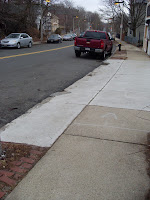 The photograph to the right (taken on a Sunday afternoon) shows the Dover Amendment Curb Cut associated with the so-called "church's" Dover Amendment parking lot. This curb cut has removed two or three parking spaces from a neighborhood already struggling with limited parking. The parking lot, seen in the photograph accompanying this post, has never been used.
The photograph to the right (taken on a Sunday afternoon) shows the Dover Amendment Curb Cut associated with the so-called "church's" Dover Amendment parking lot. This curb cut has removed two or three parking spaces from a neighborhood already struggling with limited parking. The parking lot, seen in the photograph accompanying this post, has never been used.This post is somewhat tangential to the posts to date, but it gives the reader some sense of the prior "development" of the parcel at 85 Centre Street. It has not been an entirely happy story. Here is the most recent installment.
When the so-called "church" purchased the building in March of 2003 for $370,000.00 according to the Registry of Deeds spiffy web site, the neighbors were less than enthusiastic. A church seemed the wrong use for this residential neighborhood. The neighbors had visions of increased parking problems, loud music, and folk who did not live there having an adverse impact on the neighborhood.
Kathleen Burge, in a 2 March 2008 Boston Globe article waspishly entitled "Divine Right," details what happened when churches moved into vacant buildings in neighborhoods near to Dorchester's Four Corners. The particular circumstances of of Four Corners and Bowdoin-Geneva differ to those of Fort Hill, but the aggravation visited on a neighborhood by a congregation coming from outside the neighborhood promised to be much the same: parking congestion, noise, and alienation of the congregation from its neighborhood location.
Burge's article seems to have been occasioned by Omar M. McRoberts's socio-theological research published in his book Streets of Glory. The Roundtable on Religion and Social Welfare Policy website has a brief interview with McRoberts that enlarges on Burge's Globe article.
But, what about the Dover Amendment?
The Dover Amendment limits zoning authorities in Massachusetts from restricting land use by religious and educational institutions. When you are a "church" you can do what you want with your property. Google "Dover Amendment" to learn more.
When the, so called, "church" bought the property, they "improved" the lot at #79 by paving it over and placing pieces of wood in the gutter as a sort of ramp. When the city caught them doing this without the correct permits, they had to attend a hearing to gain approval for their neat work. Being a, so called, "church" they were able to skirt neighborhood objections, and get post hoc approval for the blacktop and permission to install a curb cut.
Their curb cut has removed two or three parking spaces from an already tight parking situation. Their curb cut and parking lot has never been used. From the photograph at the top of this post one can see that twenty feet of brick hardscape has been removed, and concrete installed instead.
As far as the adverse impact on the neighborhood? Parking is worse, but the neighbors have had few complaints about noise.
Why have there been no complaints about noise? Might it be because church services have never been held at this location? A suspicious reader might suspect that what was bruited about the neighborhood as a "church" was in fact no more than a front for speculation—a speculative front that used its protected "religious" status to "improve" the property by right, making it more attractive for resale.
Nice blog! Very interesting and informative post….Thank's for sharing such a nice information….Keep it up!!
ReplyDeleteOET Coaching for Nurses in Melbourne
OET Coaching in Melbourne
OET Training in Melbourne
Best OET Coaching in Melbourne